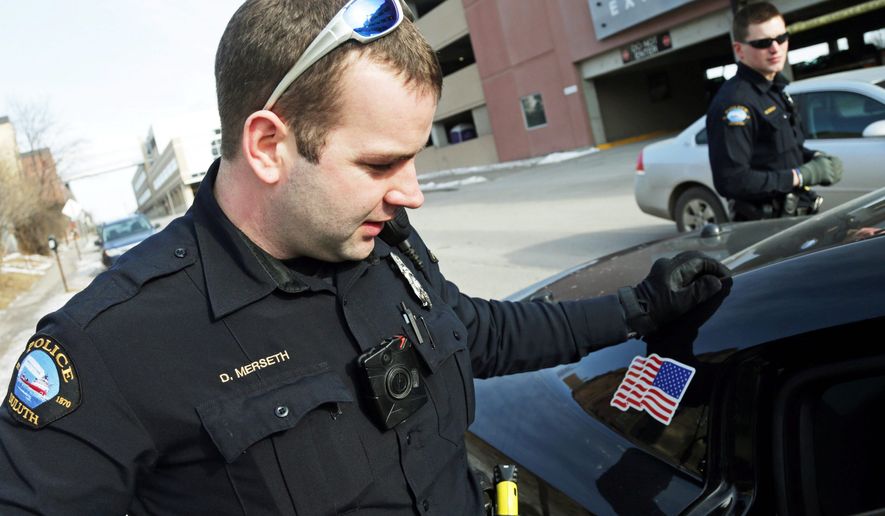The Department of Justice wants to make it easier for police to obtain and use body cameras, but the devil is in the details with executing the policy, ranging from concerns about when the cameras should be on to what sorts of images should be granted through freedom of information requests.
Outfitting cops with body cameras puts police departments in the precarious position of having to decide whether their officers need to keep their cameras on all the time or use them at their discretion, said New Mexico attorney Tom Grover. Both policies create problems, said the former Albuquerque Police Department officer.
Mr. Grover represents Jeremy Dear, an Albuquerque Police Department officer who was fired in late 2014 after he failed to turn on his lapel camera before shooting a car-theft suspect who, the officer said, pointed a handgun at him at close range. The suspect was the foster child of a county judge and their death ultimately cost Mr. Dear his job. Cops across the country could face a similar fate as body cameras become more and more common among police departments, Mr. Grover cautioned.
“I’m sure that there’s a cop today who is going to be faced with some situation and they don’t record it, for some reason,” he said. “And they’re going to be thinking, ’Oh my gosh, am I going to be fired just because I didn’t capture that video?’”
The flip side to that concern is that those police departments that make it mandatory for officers to keep their body cameras rolling through their entire shift may inadvertently force those officers to violate the rights of victims.
Police might be expected to keep their body cameras rolling while interviewing the victim of a sex crime or while entering the personal residence of a burglary victim, Mr. Grover said.
The American Civil Liberties Union has raised privacy concerns about the footage captured on body cameras and has asked questions like should the scene of a suicide or domestic battery be made public.
Such video “sometimes captures people at the worst moments of their lives,” ACLU senior policy analyst Jay Stanley told the Los Angeles Times last September. “You don’t want to see videos of that uploaded to the Internet for titillation and gawking.”
New Mexico is just one of several states across the country where body cameras are being adopted as a way provide better police accountability and where the implementation of that policy has been wrought with controversy.
In Washington D.C., Mayor Muriel Bowser supports officer cameras but wants to make the footage those cameras capture exempt from freedom of information requests, sparking controversy that she’s trying to protect the force by not being completely transparent. Legislation that would limit public access to police camera footage is either pending or has passed in Iowa, Kansas and other states.
Still, U.S. Attorney General Loretta Lynch announced last month the Department of Justice would implement a $20 million Body-Worn Camera Pilot Partnership Program to help law enforcement organizations obtain the pricey cameras. The pilot program is part of President Obama’s proposal to spend $75 million on purchasing 50,000 body-worn cameras for law enforcement agencies over the span of three years.
The Baltimore Police Department — which has come under scrutiny for its handling of the arrest and subsequent death of Freddie Gray — will be equipped with cameras in the near future, Baltimore City Councilman Brandon Scott told The Washington Times.
Body-camera advocates anticipate the devices will serve as a powerful tool for Maryland prosecutors, just as they have for prosecutors in other states.
For example, body cameras captured the police shooting of James Boyd, a 38-year-old mentally unstable homeless man who was illegally camping in the foothills near Albuquerque last year.
One body camera shows Mr. Boyd claiming to be the Department of Defense. That same camera also shows Mr. Boyd dying in a hail of bullets after police, who had spent hours trying to talk the man into leaving the area, threw a flash grenade in his direction, and opened fire when he turned his back.
Police justified their actions by stating that Mr. Boyd had two small camping knives in his hands at the time of the shooting. A local district attorney later charged two Albuquerque Police Department officers, Keith Sandy and Dominique Perez, with an open count of murder.
“The body cameras in this particular shooting — had it not been captured on film — nobody would have given a second thought to the officers’ story,” said attorney Laura Ives, who represents the family of Mr. Boyd. “And it was only because it was captured on film that the public was able to see that the officers were not in the jeopardy that they claimed to be.”
• Maggie Ybarra can be reached at mybarra@washingtontimes.com.




Please read our comment policy before commenting.